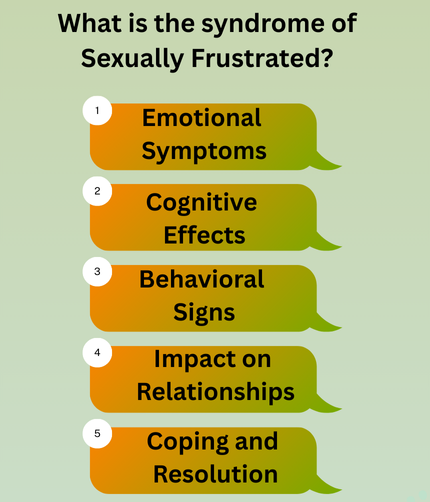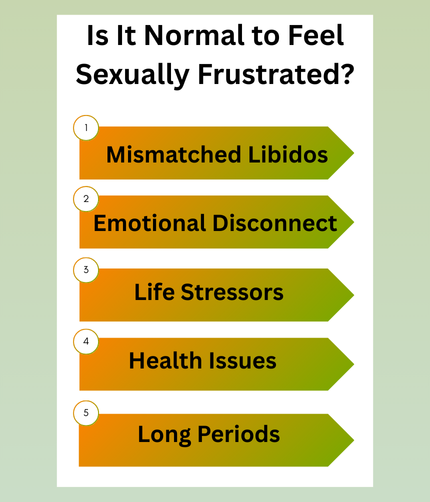Introduction:
Sexual interactions have been a significant aspect of human existence since the dawn of time, and their significance has only grown throughout time.
In addition to being a bonding experience for those in love relationships or marriages, sex is still one of the top ten basic human wants and is sought by the majority of individuals.
However, inability to make love and meet one’s sexual demands can lead to a lot of unresolved emotions and sexual unhappiness. This can seriously harm the person’s relationship and mental well-being if it is not addressed at the appropriate moment.
Many men have a strong start to their patience. They are aware that emotional distance, health problems, or stress can sometimes make a physical connection impossible.
But eventually, their tolerance may run out if they continue to feel ignored or rejected. Feeling close to their lover, valued, and wanted is more important than sex alone.
Sometimes it manifests as irritation or emotional distancing. When a guy feels unwelcome after being rejected repeatedly, he may stop pursuing intimacy, not because he no longer has the desire. Even if his lack of patience isn’t noticeable, it has an effect.
Restoring that connection and rekindling the desire for intimacy between lovers may be accomplished via open conversation, empathy, and cooperation.
What Is Sexually Frustrated?
Sexually frustrated merely indicates that a person has an innate need for closeness and does not imply that they are weak or needy.
In addition to improving one’s sexual life, recognising those emotions and healthily managing them may also enhance one’s mental health and relationship happiness.
Investigating mental or physical barriers, having open discussions with a partner, or even getting advice from a therapist or counsellor may be necessary. More sex is not the only objective; a more satisfying and profound bond is also desired.
Additionally, people may experience increased fantasies or feelings of jealousy regarding the relationships of others. Although these indicators don’t necessarily indicate a problem, they do point to the necessity of candid communication.
Unmet needs can cause people to become agitated, angry, or even feel rejected. It can affect one’s self-esteem and lead to conflict in relationships if it is not recognised and dealt with.
Any kind of relationship, whether one is married, dating, or single, can experience this dissatisfaction.
One partner may feel abandoned or unwanted in committed relationships, particularly if their intimacy or libido levels are not compatible. Arguments or emotional distancing may eventually result from that.
The Behavior of Sexually Frustrated Men
A guy who is sexually frustrated will act in ways that reflect his desire for intimacy, connection, and assurance, in addition to his need for sex.
The connection may be strengthened and that frustration reduced with open communication, emotional support, and cooperation. Recognising these symptoms may be the first step towards recovery and reconciliation.
Insecurity may also be displayed by certain guys. Their self-esteem may suffer if they experience rejection or unwanted feelings.
They could become extremely sensitive to criticism or look for approval from other people, which might further damage the relationship. This is particularly true when partners don’t communicate well or at all.
A sexually unsatisfied man could immerse himself in his career, hobbies, or physical fitness—anything to divert his attention from what he perceives as lacking.
In some cases, this is a means of avoiding the more serious problem rather than dealing with it head-on, even though it can be beneficial.
Some people withdraw both emotionally and physically rather than discussing their problems. They could cease making affectionate advances or stop talking as much. This disengagement is frequently a protective technique used to prevent emotional vulnerability or rejection.
What can happen if you’re sexually frustrated?
There may be emotional, mental, and interpersonal repercussions in addition to the physical ones. Both you and your spouse may experience stress if your sexual desires are not satisfied for an extended period. Often in silence, that dissatisfaction accumulates until it begins to interfere with other aspects of life.
You may feel lonely, unwelcome, or rejected emotionally. The absence of closeness in a relationship might cause you to feel alienated. Over time, this emotional disconnect can cause anger or a sense of unworthiness, which can undermine trust and self-worth.
Arguments, emotional distancing, and communication breakdowns can result from unsolved issues in partnerships. While the other partner feels neglected, one partner could feel under pressure.
The partnership may end, or there may be long-term discontent if this is not resolved.
The first step in coming up with a remedy that benefits your physical and mental health is acknowledging the issue.
The Potential Effects on Health
Your general health may be impacted by sexual dissatisfaction, which is not only an emotional or interpersonal problem.
Since they frequently develop gradually, it is simple to ignore these consequences until they start to interfere with day-to-day activities.
Natural sexual action generates feel-good chemicals like endorphins and oxytocin, which lower stress and help control mood.
This may result in anxiety, hyperactivity, or even physical discomfort that makes it difficult for you to fall or remain asleep.
Consequently, a lack of sleep can impair mood and concentration and impact energy levels all day.
Extended periods of stress can boost blood pressure, impair immune system performance, and elevate the risk of heart-related problems. When coupled with other pressures, sexual dissatisfaction can contribute to these effects, while it is not the only cause.
What is the syndrome of sexually frustrated?
This emotional experience is real and isn’t an indication of weakness or obsession. It normalises the experience and encourages individuals to look for polite, healthy solutions rather than repressing or misdirecting their emotions by acknowledging that it can have both psychological and physical impacts.

- Emotional Symptoms
Other than physical desire, this can cause a variety of emotional problems. Irritability is a prevalent emotion, causing people to react excessively to tiny things and feel on edge all the time.
Often developing in silence, this tension can have an impact on a person’s interactions with friends, partners, and even coworkers.
Some people’s self-esteem may suffer when they feel unwelcome or undesirable. Even if their spouse isn’t aware of the problem, they may eventually start to doubt their worth, beauty, or connection in a relationship, which can cause emotional isolation and loneliness.
This may lead to a feeling of internal conflict or emotional perplexity. Having unfulfilled demands might make someone feel bad about themselves or embarrassed to mention them.
- Cognitive Effects
This can have a big impact on a person’s thoughts and emotional processing. The tendency for the mind to wander to thoughts of unfulfilled ambitions, wants, or insecurities is one of the most prevalent cognitive impacts. Making decisions, staying focused at work, and living life to the fullest can all be hampered by this.
If these ideas are not addressed, they can spiral out of control and fuel feelings of anxiety, envy, or self-comparison.
People occasionally engage in emotional rumination or overthinking, which includes reading too much into a partner’s conduct, rehashing previous exchanges, or persistently questioning why their demands aren’t being satisfied.
This thought pattern can exacerbate emotional weariness and hinder clear communication and constructive problem-solving.
- Behavioral Signs
A person’s conduct frequently reflects this before they even become aware of what is upsetting them. One typical symptom is heightened irritability or a short fuse; they may lose their temper over little matters, behave impatiently, or exhibit less tolerance in romantic or social situations.
Withdrawal or emotional detachment is another obvious trait. A person may cease making advances towards affection, shy away from closeness, or appear less interested in the partnership.
They may lose themselves in their work, over-exercise, screen time, or even flirt with others outside of their relationship.
These actions are frequently unconscious coping mechanisms or efforts to refocus the unresolved stress. They seldom address the underlying emotional need that is irritating, even if they might offer temporary respite.
- Impact on Relationships
Relationships may be severely strained as a result, frequently leading to emotional separation between partners. One individual may experience sentiments of rejection, loneliness, and alienation if they are continuously unfulfilled.
Misunderstandings may arise over time as a result of this emotional disconnect, with one partner feeling under pressure and the other disregarded or undesired.
Furthermore, communication failures are frequently the result of unresolved sexual dissatisfaction. Because they fear confrontation or making the other feel bad, couples may avoid discussing their needs instead of confronting the issue head-on.
As a result of both parties feeling ignored or misunderstood, this silence can breed animosity and worsen the relationship.
- Coping and Resolution
The first step in overcoming sexual dissatisfaction is having an honest conversation. Partners must be able to openly discuss their needs, wants, and difficulties without passing judgment or assigning blame.
A secure environment for both parties to discuss their worries and work through potential solutions may be established by plainly expressing emotions.
A further successful tactic is to practice emotional connection outside of the bedroom. A stronger link can be formed by deepening the emotional connection through deeper talks, date nights, or shared experiences.
Physical intimacy frequently follows an increase in emotional closeness, which eases the tension brought on by dissatisfaction.
For deeper problems, it might be helpful to seek professional assistance, whether via individual counselling or couples therapy.
As a man, what happens if you are sexually frustrated?
A sexually dissatisfied man might grow more reclusive or aloof. He may withdraw emotionally or physically to prevent rejection rather than speaking honestly about his feelings.
Long-term frustration can also impair sleep, which might result in exhaustion or low energy. Men may also have increased sexual desire, which can be very strong and frustrating if it is not satisfied.
As a result, the closeness in the relationship may eventually suffer as neither spouse will be able to comprehend the other’s needs. Relationship dissolution or emotional distance may result from this if left unchecked.
Long-term sexual dissatisfaction that is not resolved might result in more severe emotional or mental health problems, such as depression or poor self-esteem.
The relationship’s general health may be jeopardised by persistent discontent, as it can also result in elevated sentiments of annoyance or animosity towards the spouse.
Some men may even start looking for sexual or emotional approval outside of the relationship, which can cause more issues.
Getting expert treatment, such as individual or couples counselling, can help overcome deeper mental or physical hurdles if communication alone isn’t enough.
When a woman has sexual frustration, what happens?
A woman’s emotional, physical, and mental health may all be impacted when she feels sexually frustrated.
Irritability or dissatisfaction can result from unfulfilled sexual demands, both within and outside of the bedroom. A person’s mood and social interactions may suffer as a result of this emotional pressure.
Particularly if the problem continues over time, sexual dissatisfaction can lead to tension or worry. Relationship pressure might also be a contributing factor to the stress, in addition to sexual dissatisfaction.
Ironically, persistent sexual annoyance might occasionally result in a decline in sexual desire. A decrease in desire for intimacy may occur, and the body may become less sensitive to sexual impulses.
Sexual dissatisfaction can eventually lead to decreased sexual arousal or trouble experiencing an orgasm because unfulfilled emotional demands cause the body to become less receptive to stimuli.
Women may go elsewhere for approval or affirmation if they believe that their needs are not being satisfied in a relationship. This might involve pursuing attention from other people or even having fantasies about having sex outside of a relationship.
Self-pleasure as a means of exploring one’s sexual wants may also assist in identifying potential relationship gaps.
A full and gratifying sexual dynamic may be created by both partners when they recognise that sexual desires are legitimate and should be supported.
Ways to Get Past Sexually Frustrated
Although it can be difficult, with perseverance, understanding, and communication, it is possible to get over this.
- Talk to Your Spouse
It might be frightening to discuss this with your partner, but it is a necessary step in resolving the conflict and enhancing your bond.
After talking about the problem, decide on a strategy to get back in touch both physically and emotionally. Increase physical affection, schedule more date evenings, or look at methods to have meaningful sex that satisfies both of your needs.
You may resolve the matter and strive towards a more robust and fulfilling relationship by approaching the discussion with empathy, openness, and kindness.
- Increase Your Intimacy
One of the most important aspects of keeping a solid emotional and physical bond in a relationship is increasing closeness. Intimacy includes emotional connection, mutual regard, trust, and affection in addition to sex. Regardless of how long you’ve been dating or how new you are, concentrating on strengthening your bond might help you become closer.
Intimacy may be greatly enhanced by physical contact. From basic handshakes, hugs, and cuddles to more personal touches in the bedroom, it can take many forms. Frequent physical contact builds intimacy and security, which increases your sense of worth and connection.
- Sexual Boundaries
When it comes to sexual behaviour, sexual boundaries are the restrictions and rules that each individual establishes for themselves. These limits are influenced by individual preferences, comfort levels, prior experiences, and personal beliefs.
These might include the kinds of sexual behaviours that a person feels comfortable engaging in, the things that they are unwilling to engage in, or the way that they would want to be treated in private settings.
These are essential for preserving a relationship’s emotional and physical security. Along with ensuring that both parties are in agreement, they also safeguard against unpleasant encounters and encourage consent.
An atmosphere of trust and respect is created when sexual boundaries are upheld, making intimacy more pleasurable and satisfying for both parties.
- Sexual Dysfunction
A range of conditions that hinder a person from being completely satisfied during sexual engagement are referred to together as sexual dysfunction. Physical, psychological, or a combination of both reasons may be involved, and it can impact individuals of any gender.
Sexual dysfunction can affect one’s general well-being, relationships, and self-esteem. To properly treat and manage sexual dysfunction, it’s critical to comprehend its many forms and causes.
When a man cannot get or keep an erection strong enough for sexual activity, he has erectile dysfunction, one of the most prevalent types of sexual dysfunction in males. In addition to psychological causes like stress, worry, or sadness, a variety of medical conditions, including diabetes, heart disease, or hormone imbalances, can also lead to erectile dysfunction.
- Sex Therapy
Sex therapy is a type of psychotherapy intended to assist individuals with issues about intimacy and sexual health. Sex therapists are qualified to help individuals and couples work through sexual issues because they are educated in the psychological and physiological facets of sexual wellness.
Unresolved disagreements in a relationship, emotional distance, or communication issues can occasionally lead to sexual issues. Couples may enhance their emotional ties, increase intimacy, and address relationship problems that impact sex with the aid of sex therapy.
Sex therapy offers victims of sexual abuse or trauma a secure setting in which to confront and recover from prior traumas that may be impacting their sexual lives.
Has He Recently Made Casual Remarks On Your Sexual Life Or Sex?
Recent casual comments about your sex or sexual life might mean several things, depending on the tone and context. It could be a funny or casual remark in some situations, but if it bothers you, it might indicate a boundary problem. It’s critical to evaluate whether the comments were considerate of your privacy and feelings.
Addressing the issue is crucial if these comments seem intrusive or improper. It might be helpful to have a polite discussion about your limits to make it clear what can and cannot be discussed.
To keep connections strong and make sure that everyone feels valued and at ease, clear communication is essential.
In the end, your own emotions and boundaries should guide your response. If the comments seem rude or unwanted, don’t be afraid to stand up for yourself and let others know how you feel.
What physical changes take place when you feel sexually frustrated?
An accumulation of physical strain, especially in the muscles, may result from this. You may feel tense in your jaw, lower back, or shoulders. The sensation of jitters, fidgetiness, or an inability to relax is frequently accompanied by this physical tension.
The heightened condition may leave you feeling tense or nervous, but it is a necessary physiological preparation for sexual action.
Females may experience pelvic discomfort or heaviness as a result of prolonged arousal without climax. Even though these feelings are unpleasant, they are harmless and often go away with time or relaxation.
If you’re distracted by sexual ideas or feelings of discontent, you may also find it harder to focus.
Your body uses these outward manifestations to communicate unfulfilled desires. Periodic sexual dissatisfaction is natural, but if the symptoms persist, they may impact your general health and should be addressed with healthy outlets, candid conversations with a partner, or therapy.
Is It Normal to Feel Sexually Frustrated?
Regardless of whether you’re single or in a relationship, this is a normal human feeling that can happen for several reasons. It frequently stems from unfulfilled sexual desires, emotional disconnection, or even outside variables like stress or medical conditions.
It is only an indication that your emotional and physical needs are not being satisfied at that particular time; it does not suggest that there is a problem with you or your relationship.

- Mismatched Libidos
A scenario known as “mismatched libidos” occurs when two people in a relationship have varying levels of sexual desire or frequency of sexual activity. One spouse may feel abandoned, rejected, or disappointed, while the other may feel overburdened or under strain.
Although mismatched libidos are a prevalent problem in partnerships, they don’t have to cause friction or dissatisfaction.
Couples may transcend libido differences and fortify their emotional and physical bond with mutual respect, honest communication, and a willingness to reach a compromise.
Finding healthier, more satisfying ways to connect might help couples feel less frustrated when they realise that libido variations are common and controllable.
- Emotional Disconnect
When partners in a relationship experience emotional detachment, they are said to be emotionally distant, disconnected, or unattached. This may occur for several reasons, including unresolved disputes, poor communication, or unfulfilled demands.
Emotional closeness can be hard to sustain in a relationship when stress from job, family, or personal health spills over. Emotional connection can be inadvertently neglected when life’s needs take precedence.
You may feel emotionally alone even while you are physically with your companion. This may lead to feelings of loneliness and a yearning for the intimacy of the past.
- Life Stressors
The external demands and difficulties that might impair a person’s emotional, physical, or mental health are referred to as life stressors. These pressures might originate from a variety of life circumstances, including job, family, health, or money worries.
It’s critical to look after your physical and emotional well-being when under stress. This might be engaging in hobbies, meditation, physical activity, or quality time with encouraging friends or family. You can assist and manage stress in your relationship more effectively when you look after yourself.
Seeking assistance from a counsellor or therapist may be quite beneficial if stress becomes unbearable. They can give coping mechanisms, impart communication skills, and present an unbiased viewpoint on the difficulties the couple is dealing with.
- Health Issues
Relationships and the individual themselves can be greatly impacted by health issues, particularly when they lead to emotional, physical, or mental stress.
A person’s relationship with their partner and their ability to manage intimacy, communication, and emotional connection may alter as a result of chronic diseases, chronic conditions, or transient health issues that impact their quality of life.
Depression, anxiety, and other mental health conditions can have a profound impact on a person’s emotional state and cause them to withdraw or isolate themselves. The spouse may feel frustrated or disconnected as a result of their inability to comprehend the changes.
Sexual desire or performance may be impacted by hormone imbalances, erectile dysfunction, or dry vagina. If not spoken honestly, this can cause partners to get frustrated and disappointed, and their relationship may become strained.
- Long Periods
Extended periods of stress, sickness, or life transitions can significantly affect people and relationships. Long-term stress may have an impact on a person’s emotional health and relationship dynamics, whether it is brought on by personal hardships, physical or mental health issues, or outside influences.
Partners may become frustrated and cease having open communication as a result of ongoing issues.
Misunderstandings can accumulate, and it could seem that neither partner is genuinely connecting—both are only going through the motions. In the partnership, this may lead to feelings of loneliness.
Even in the face of long-term difficulties, relationships may be maintained by acknowledging that difficult times are a natural part of life and not the end of the road.
How Can I Effectively Handle Sexual Frustration?
Finding appropriate coping mechanisms and comprehending the underlying causes of sexual dissatisfaction are essential to properly managing it.
Medications like Vigora 100 mg, Cenforce 50, and Sildigra 250mg are also available.
Particularly during stressful times, relationship transitions, or when wants aren’t being fulfilled, it’s a common occurrence. Addressing the irritation with mindfulness and self-care is more important than ignoring it.
Could it be a mismatch in libido between you and your spouse, a lack of physical closeness, or emotional distance? You can react more productively rather than irritably or withdraw if you know why you’re feeling this way.
In a relationship, be honest with your spouse about your wants and feelings without placing blame or putting pressure on them. Better understanding, greater closeness, or solutions like experimenting with other physical and emotional connections might result from sincere discussions.
When coupled intimacy isn’t feasible or compatible, self-gratification is also a healthy approach to release sexual tension. Reconnecting with your body and letting go of frustration can be achieved through this safe and typical release.
Consulting a therapist can occasionally offer further help and coping mechanisms, particularly if it’s impacting your relationships or generating emotional pain.
This type of manipulation is not appropriate for a long-term, healthy relationship and can result in sentiments of bitterness as well as sexual dissatisfaction.
To get what they want or as a kind of punishment, some people enjoy denying their spouse sexual pleasure. Check out our website, Medypharmacy, here.
























